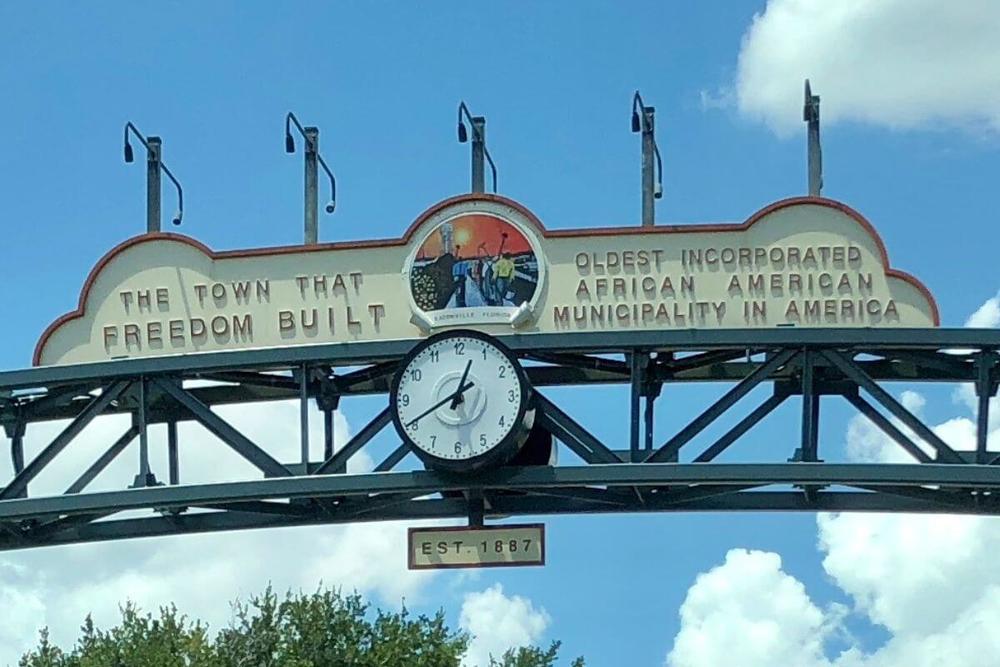
Caption
The entrance sign to the town of Eatonville, Florida where the famed author and anthropologist Zora Neale Hurston lived as a child.
Credit: Courtesy Authentic Florida
Building a series of travel stories about the hometowns of Southern writers, Salvation South editor Chuck Reece discovered an essay by the novelist and anthropologist Zora Neale Hurston in which she discusses the town of Eatonville, Florida where she grew up. He has more thoughts on Hurston and her connection to the historic town in this week's commentary.

The entrance sign to the town of Eatonville, Florida where the famed author and anthropologist Zora Neale Hurston lived as a child.
People call Eatonville, Fla., “the town that freedom built.” It’s a small town of about twenty-four-hundred souls, just east of Interstate Four, not far north of Orlando.
The town was incorporated in 1887 — one of the first self-governing, all-African American cities in America. Twenty-seven Black men met at the St. Lawrence Odd Fellows Hall to sign the charter.
I’ve never been to Eatonville, but I want to go. The magazine I edit, Salvation South, just started a series of stories we’re calling “The Southern Reader’s Travelogue” about places where you can learn about our region’s greatest writers. Eatonville is where one of the South’s rarest writing talents grew up — Zora Neale Hurston. Her parents moved the family there from Notasulga, Ala., when Zora was only 3. And Eatonville was the setting for her beloved novel Their Eyes Were Watching God.
Nine years before that novel came out — in 1928, when she was 37 years old — she wrote about her hometown in an essay called “How It Feels to Be Colored Me” for a magazine called World Tomorrow: a Journal Looking Toward a Christian World. That essay she wrote is a thing of beauty. In it, Zora describes her life as she grew from a child in Eatonville to a scholar at Barnard College and Columbia University in New York City.
“I remember the very day that I became colored,” she writes. “Up to my 13 year I lived in the little Negro town of Eatonville, Fla. It is exclusively a colored town. The only white people I knew passed through the town going to or coming from Orlando.”
“But changes came in the family when I was 13,” she continues, “and I was sent to school in Jacksonville.” In Jacksonville, Hurston writes, “I was not Zora of Orange County anymore, I was now a little colored girl.”
“But I am not,” she continues, “tragically colored.”
As the essay goes on, we follow Zora as she moves to New York and becomes a full-on version of herself. We watch her as she sets “my hat at a certain angle and saunter down Seventh Avenue, Harlem City, feeling as snooty as the lions in front of the Forty-Second Street Library.”
We listen as she concludes, “Sometimes, I feel discriminated against, but it does not make me angry. It merely astonishes me. How can any deny themselves the pleasure of my company? It's beyond me.”
It’s an absolutely inspiring piece of writing. And it made me want to check out Eatonville. Today, it’s part of the vast Orlando sprawl, but we have to remember that it gave birth to one of the greatest writers the South ever produced.
If you want some tips about visiting Eatonville — and a link where you can read Hurston’s essay — come visit us at SalvationSouth.com.
Salvation South editor Chuck Reece comments on Southern culture and values in a weekly segment that airs Fridays at 7:45 a.m. during Morning Edition and 4:44 p.m. during All Things Considered on GPB Radio. You can also find them here at GPB.org/Salvation-South and please download and subscribe on your favorite podcast platform as well.
Building a series of travel stories about the hometowns of Southern writers, Salvation South editor Chuck Reece discovered an essay by the novelist and anthropologist Zora Neale Hurston in which she discusses the town of Eatonville, Florida where she grew up. He has more thoughts on Hurston and her connection to the historic town in this week's commentary.